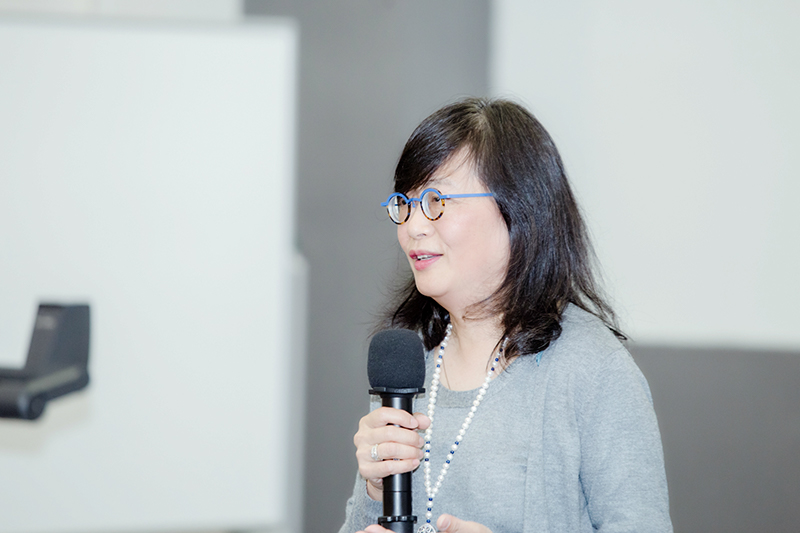
In his well-known 2005 commencement speech at Kenyon College, the celebrated American writer and philosopher David Foster Wallace opened with a thought-provoking tale:
The central message is one of awareness, of seeing what is hidden in plain sight. And it was with this same parable that businesswoman Frances Chang started her talk at Duke Kunshan University on ‘Investment, Entrepreneurship and Wealth.’
Awareness is crucial if you want to be a successful investor, according to Chang. ‘But being aware of only the obvious is not enough. Before making any investment, you must understand how to read the economic cycle and learn to follow trends.’
Chang is the Chief Marketing Officer and Executive Director of Noah Holdings, the largest private wealth management firm in China, and she knows from experience what can go wrong when you fail to read the signals.
Growing up in Taiwan in the 1970s and ’80s, she witnessed the boom that followed the government-initiated Ten Major Construction Projects, a large-scale infrastructure plan that saw the island rapidly develop into an export-driven economy.
Spotting an opportunity, she promptly returned home after graduating from college in the United States in the late ’80s and invested her life savings in Taiwan equities.
Soon after, the Taiwan stock market soared, leading to an incredible return on her investment. In less than three years, Chang said she turned NT$500,000 into NT$80 million, roughly $3 million at the time. She cashed in her entire portfolio in January 1990 in anticipation of a market plateau.
Young, educated and cash-rich, she was on top of the world. ‘When I made that fortune, I thought I was a god, capable of predicting the market,’ she said.
After seeing a steady decline in the market, and acting on the basic principle of ‘buy low, sell high,’ Chang decided to reinvest all her earnings the moment she believed prices had bottomed out. But she re-entered the market too soon. Prices continued to drop and she was left no choice but to sell up, this time on far less favorable terms.
‘When the dust settled, $3 million was gone. In the span of a few months, I went from the highest of highs to the lowest of lows.’
Chang, a strong advocate of education and lifelong learning, said she used the experience to her advantage. She began studying stock market behaviors, particularly what motivated people to make investments.
To learn more, she took a job as a research analyst at an American financial services firm operating in Taiwan, where she soaked up knowledge and built strong connections. From there, she moved into a leadership role in the marketing department, although she continued to pursue sales leads despite receiving no commission.
‘I wanted to understand the essence of the market and why clients wanted to invest with us,’ she said.
After a period of high sales earnings propelled by her largest client, Taiwan Cooperative Bank, Chang quickly began rising the ranks and was appointed Executive Vice President within six years. However, her professional success took a toll on her personal life, resulting the breakdown of two marriages.
‘I look back on my first two marriages not as failure but a lesson,’ she said. ‘And I couldn’t be happier in my third and current marriage.’
Chang believes that the lessons learned in her professional or personal life form the bedrock of her value system, the core ingredients of which are:
- Do the right thing. Create an honest living and be true to yourself. Don’t chase fast money ‘ it comes fast and goes fast.
- Be bold and daring, and don’t be afraid of making mistakes. Mistakes should be embraced, as every new challenge makes you stronger.
- Be curious. Don’t let your job description define you. Learn what interests you.
- Be humble, and be grateful to those who have helped you along the way. Helping others will also benefit you in the long run.
She said this value system can be applied to any field but that her successes and failures in the financial industry tend to pivot on one key factor: Awareness.
‘It’s something an investor can and should see early in their career. You must be aware, you must know where you are in that economic cycle,’ she said.
Before making any investment, Chang stressed that it is essential to learn how to read fluctuations in the economic cycle. National economies vary wildly, and even regional economies within a country often differ. Some turn over in a year, others take a decade.

Chang advised always keeping an eye on interest rates, as this can give an indication of where an economy is in the cycle.
In a period of recession, defined by high interest rates and stagnate economic growth, investments should be limited to savings accounts and government bonds, she said.
During a depression, when interest rates drop, investors should look for signs of recovery, usually in the form of policy, as the ‘government is the main driver of the economy.’ This is a time to put money into equities.
In a period of recovery and prosperity, when interest rates climb high, Chang added that it is best to consider real estate, commodities and, at the peak, cash deposits.
‘Don’t invest unless you’re really into it,’ she said. ‘Spend sufficient time, be professional, learn from your mistakes. As a beginner, you can also try to invest a fixed amount of money every month, as it lowers the relative cost in the long run. ‘
Look around, young investor. This is the water.
Frances Chang was invited to Duke Kunshan University as part of the Distinguished Speaker series. She is chief marketing officer and executive director of Noah Holdings, the largest private wealth-management firm in China. Chang is also a key donor to Duke Kunshan’s scholarship fund.

